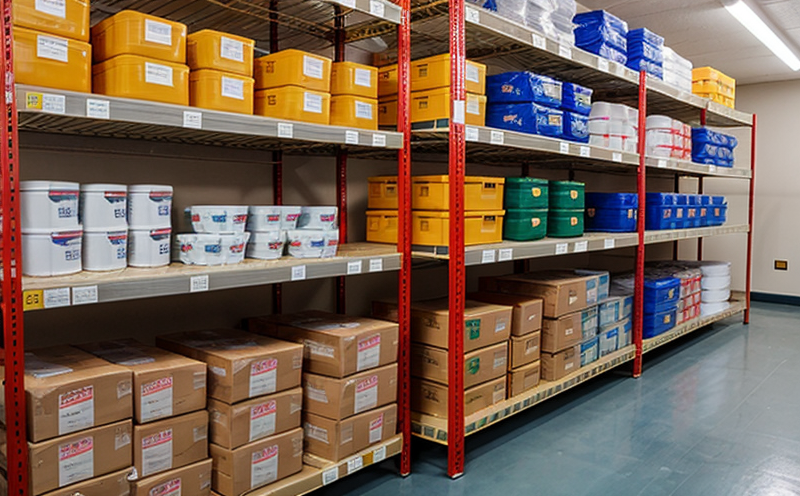Long Term Stability at 25C 60RH Testing
The long-term stability testing of pharmaceutical products under conditions of constant temperature and humidity (25°C, 60% RH) is a critical step in ensuring product quality and safety. This type of testing simulates real-world storage environments to evaluate the potential for degradation over extended periods. The International Conference on Harmonization (ICH) guidelines provide clear standards that pharmaceutical manufacturers must follow to ensure drug products maintain their efficacy and stability.
The 25°C, 60% relative humidity conditions are chosen because they represent a worst-case scenario for most environments where the product may be stored. Conducting tests under these conditions helps identify any potential issues early in development, allowing manufacturers to implement necessary changes before commercial launch. This testing is particularly important for active pharmaceutical ingredients (APIs), excipients, and finished dosage forms.
In this service, we employ state-of-the-art equipment such as temperature and humidity chambers capable of maintaining precise controls over these parameters. The tests are conducted in compliance with ICH guidelines Q1A(R2) and Q5C, ensuring that all results are valid and reliable. Our experienced team ensures that the samples are prepared according to industry standards, using appropriate containers and packaging materials.
The testing process involves monitoring various physical and chemical properties of the drug substance or product over time. These may include changes in color, weight, dissolution rate, and other critical quality attributes (CQAs). The data collected during these tests is used to determine the shelf life of the product and any necessary storage conditions.
Our laboratory adheres strictly to Good Laboratory Practices (GLP) and follows stringent quality assurance protocols. This ensures that all results are accurate, reproducible, and can be relied upon by regulatory bodies such as the FDA or EMA. By partnering with us, you gain access to comprehensive data that supports informed decisions regarding product development and lifecycle management.
| Parameter | Description |
|---|---|
| Temperature (°C) | 25°C ± 1°C |
| Relative Humidity (%) | 60% RH ± 5% |
| Duration (Months) | 6, 12, or more months as required by the product lifecycle |
| Monitoring Frequency | Daily monitoring with data loggers and periodic sample analysis |
The results of these tests are crucial for several reasons. They help in determining the product's shelf life, which is essential for accurate labeling and marketing claims. Additionally, they support regulatory submissions by providing robust data that meets regulatory requirements. Furthermore, this testing allows manufacturers to make informed decisions about packaging design and storage conditions, ensuring product stability throughout its lifecycle.
Our team of experts works closely with clients to understand their specific needs and objectives. We offer custom test protocols tailored to individual products or portfolios, ensuring that the testing aligns perfectly with each client's unique requirements. Whether you're conducting initial stability studies or supporting ongoing compliance efforts, our comprehensive approach provides peace of mind knowing your product is being tested in accordance with best practices.
Why It Matters
The importance of long-term stability testing cannot be overstated. Ensuring that pharmaceutical products remain stable and effective over extended periods directly impacts patient safety and compliance with regulatory standards. Inconsistencies in product performance can lead to ineffective treatments, increased healthcare costs, and even life-threatening situations.
Stability testing also plays a vital role in protecting the reputation of pharmaceutical companies. A reliable track record of adhering to strict quality control measures instills confidence among consumers and regulatory bodies alike. Moreover, it supports continuous improvement initiatives within R&D departments by identifying areas for enhancement early on.
From an operational perspective, accurate stability data enables better resource allocation strategies. Knowing precisely how long a product can remain stable helps optimize inventory management practices, reducing waste and minimizing costs associated with premature expiry.
Industry Applications
This testing is particularly relevant across various sectors within the pharmaceutical industry:
- New Drug Development: Early identification of stability issues allows for timely adjustments in formulation and process design.
- Manufacturing: Ensures that production processes consistently yield high-quality products meeting all regulatory requirements.
- Retail & Wholesale Distribution: Guarantees that products reach the market in optimal condition, maintaining brand integrity.
Use Cases and Application Examples
The following examples illustrate how this testing contributes to different aspects of pharmaceutical development and manufacturing:
| Scenario | Description |
|---|---|
| New Drug Candidate Selection | Determining which formulation best maintains stability over time. |
| Process Optimization | Evaluating the impact of process changes on product quality and shelf life. |
| Package Design Evaluation | Assessing how different packaging materials affect product stability during storage. |





